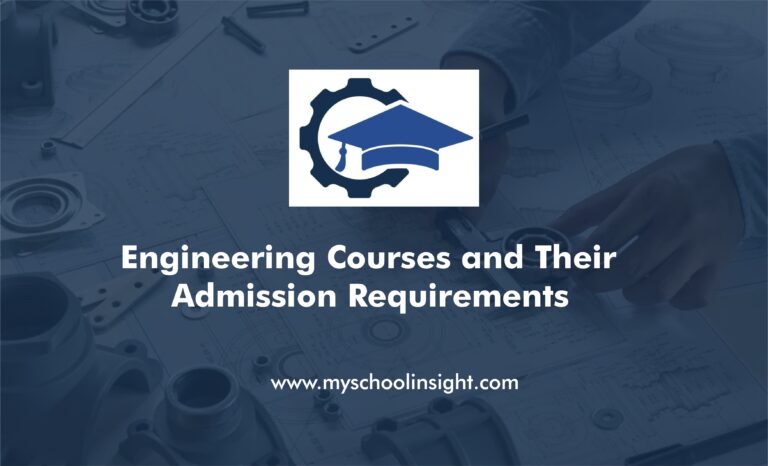How to Choose the Right Course Based on Your Career Goals

The decision to study a specific course is one of the most important decisions a student can make. The decision you make does not only have an influence on your academic trajectory but greatly contributes to the development of your career, the way you live, and whether you are satisfied with it in the future.
Numerous learners find it hard to decide on the course selection especially when they come out of secondary school or when they are about to start the Joint Admissions and Matriculation Board (JAMB) exams in Nigeria. Others choose based on family press, peer pressure or current offerings of job market -only to find out that they are miserable, dissatisfied and not performing well.
Here is a better method, however.
Usually, the most successful students and professionals are the ones who select the courses that will suit their personally inclined abilities, talents, and interests. Studying in an area of high interest/strength gives you more motivation to learn and excel in school, and helps you feel more fulfilled and sure of your future profession.
Understanding Your Strengths: The Foundation of a Smart Course Choice
Before you can pick the right course, you need to understand what your strengths are. Most people limit their definition of strength to school grades, but it goes much deeper.
Strengths include:
- Natural talents – things you’re effortlessly good at (e.g. drawing, organizing, storytelling)
- Skills you’ve developed – abilities you’ve gained through experience or learning (e.g. programming, writing, leadership)
- Cognitive abilities – how you think and process information (e.g. logical thinking, creative thinking, memory)
- Interpersonal traits – how you relate to others (e.g. empathy, persuasion, teamwork)
- Personality traits – your emotional and behavioral tendencies (e.g. curiosity, determination, patience)
A strength is any quality that:
- Feels natural and energizing when you use it
- Delivers consistently strong performance
- Is recognized and valued by others
Self-Reflection: Questions to Identify Your Strengths
Ask yourself the following:
- What subjects do I enjoy and excel at in school?
- What activities make me lose track of time because I enjoy them?
- When do people often ask for my help or advice?
- What achievements am I most proud of, and what strengths helped me get them?
- What kind of tasks do I look forward to?
You can also ask friends, teachers, or mentors:
“What do you think I’m naturally good at?”
Their answers might reveal hidden strengths you didn’t notice.
Tools and Tests to Help You Discover Your Strengths
If self-reflection isn’t enough, don’t worry — there are several assessments and tools designed to help you uncover your strengths and match them with suitable careers or courses.
1. Personality and Career Assessment Tests
These tools analyze your personality type, work style, and natural inclinations to suggest compatible career paths and courses.
Popular assessments include:
- 16Personalities (MBTI-based) – Identifies your personality type and how it affects your career choices.
- CliftonStrengths (by Gallup) – Offers a deep dive into your top strengths and how to use them.
- Holland Code (RIASEC Test) – Matches your interests to six career categories.
- Career Explorer / Sokanu – Combines interests, values, and personality to give course suggestions.
2. JAMB Career Guidance Resources
For students in Nigeria, JAMB occasionally provides career guidance materials during UTME registration or through their website. These can help align your subject choices with your strengths and desired course.
3. School-Based Career Counseling
Many secondary schools offer guidance and counseling services. Your school counselor can help interpret your academic performance and behavior to suggest suitable course options.
Matching Strengths with the Right Courses
Once you’ve identified your strengths, the next step is to map them to available courses in universities, polytechnics, or colleges.
Here’s a comprehensive table matching strengths to courses:
| Strength Area | Examples of Related Strengths | Recommended Courses |
|---|---|---|
| Logical Thinkers | Mathematics, problem-solving, reasoning | Engineering, Computer Science, Accounting, Statistics |
| Creative Minds | Artistic, imaginative, expressive | Fine Arts, Graphic Design, Architecture, Media Studies |
| Verbal Communicators | Persuasive, articulate, expressive | Law, Mass Communication, Public Relations, Education |
| Tech-Savvy | Coding, tech troubleshooting, systems thinking | Software Engineering, IT, Cybersecurity, AI |
| Empathetic Helpers | Caring, emotionally intelligent, nurturing | Nursing, Medicine, Psychology, Social Work |
| Business-Oriented | Leadership, negotiation, money management | Business Admin, Economics, Marketing, Banking & Finance |
| Investigative Thinkers | Curious, analytical, research-driven | Microbiology, Physics, Biochemistry, Sociology |
| Practical/Hands-On | Manual skill, mechanical understanding | Agriculture, Building Tech, Vocational Courses |
When your course of study is rooted in your natural strengths, the likelihood of success and satisfaction significantly increases.
Real-Life Examples: How Students Matched Strengths with Courses
Let’s look at a few real-life scenarios to bring this to life.
Example 1: Chioma – The Creative Thinker
Chioma always loved drawing, storytelling, and editing videos. While her parents initially pushed for Law, her strengths clearly lay in visual communication. She decided to pursue Mass Communication with a focus on digital media and now works in creative advertising.
Example 2: Musa – The Analytical Mind
Musa was always the top of his class in mathematics and physics. He enjoyed solving technical problems and building small gadgets. Naturally, he chose Mechanical Engineering, which aligns with both his strengths and passions.
Example 3: Amina – The Empathetic Leader
Amina was known for helping classmates with personal problems and had strong emotional intelligence. Though she had average grades, her people skills were exceptional. She chose Psychology, a field that values empathy and communication.
Key Questions to Ask Before Finalizing a Course
Even after identifying your strengths and exploring course options, it’s important to evaluate how each potential course fits into your overall life goals.
Ask yourself:
- Do I enjoy the core subjects in this course?
- Will this course challenge and grow my strengths?
- What career options are available after studying this course?
- What is the demand for professionals in this field?
- What kind of lifestyle and work environment does this field offer?
- Will I need further study (master’s, certifications) to succeed in this career?
- Is this course available in my preferred universities or polytechnics?
- Do I meet the JAMB subject requirements for this course?
Being realistic while staying true to your strengths helps you make a well-rounded choice.
Aligning Your Course Choice with JAMB and University Requirements
After identifying the right course based on your strengths, it’s essential to verify that your academic background and exam plans align with that choice—especially if you’re applying through JAMB in Nigeria.
Step 1: Check JAMB Subject Combinations
Each course has a specific set of JAMB subject requirements. Failing to select the correct subject combination can make you ineligible for admission, even if you have high scores.
For example:
| Course | Required JAMB Subjects |
|---|---|
| Medicine & Surgery | English, Biology, Chemistry, Physics |
| Law | English, Literature, Government, CRS/IRS |
| Engineering | English, Mathematics, Physics, Chemistry |
| Accounting | English, Mathematics, Economics, Government |
| Mass Communication | English, Literature, Government, CRS/IRS |
| Computer Science | English, Mathematics, Physics, Chemistry |
Use the official JAMB brochure to check for up-to-date subject combinations, cut-off marks, and university offerings.
Step 2: Understand O’Level Subject Requirements
In addition to JAMB, universities will also check your WAEC/NECO/NABTEB results to ensure you passed the relevant subjects for your chosen course.
For instance, to study Engineering, you need at least 5 credits in subjects like Mathematics, English, Physics, and Chemistry.
Step 3: Match Your Course with the Right Institution
Not all universities offer all courses. Once you’ve settled on a course:
- Make a list of institutions offering it
- Compare their cut-off marks, tuition fees, campus facilities, and graduate success rates
- Decide whether you’d prefer a university, polytechnic, or college of education, depending on your academic profile and goals
If your current strengths don’t meet the requirements for your desired course, you might consider:
- Taking a pre-degree/remedial program
- Choosing a related course with similar career outcomes but lower cut-off marks
- Preparing more thoroughly for the next UTME
Common Mistakes to Avoid When Choosing a Course
Many students fall into the trap of picking the wrong course for the wrong reasons. Here are the most frequent mistakes — and how to avoid them.
1. Choosing Based on Parental or Peer Pressure
While family and friends mean well, no one knows your true interests better than you do. A course that doesn’t match your strengths will likely lead to burnout and disappointment.
Instead: Listen to advice, but make a decision based on self-reflection and research.
2. Picking a Course Just for Prestige
Courses like Medicine, Law, and Engineering are often glamorized. But if your strengths don’t align, you might struggle unnecessarily.
Instead: Choose a course where you can thrive, not just survive.
3. Chasing Money Only
Yes, salary matters. But entering a career just for the money can leave you unfulfilled, especially if the job doesn’t suit your personality or strengths.
Instead: Aim for a balance between passion, ability, and earning potential.
4. Ignoring Job Market Trends
Some courses are becoming obsolete due to technological advancements. Others are booming with opportunities. Don’t make decisions in a vacuum.
Instead: Research current and future job market trends. Explore careers that are future-proof and in demand.
5. Not Researching the Course Content
Many students pick a course based on the title alone without understanding what the course actually entails.
Instead: Look at the course structure on university websites. Review the subjects taught in each year to know what you’re signing up for.
How to Make the Final Decision: A 7-Step Checklist
Once you’ve gathered all the necessary information, it’s time to make your final choice. Use this 7-step checklist:
Step 1: List Your Top Strengths
- What am I naturally good at?
- What subjects do I love?
- What kind of work would energize me?
Step 2: Shortlist 3–5 Courses That Align with Those Strengths
- Use the strength-to-course table from earlier in this article
- Consider personal interests and skills
Step 3: Match Courses with Institutions and Cut-off Marks
- Use the JAMB brochure to find universities that offer your courses
- Compare admission requirements
Step 4: Confirm Subject Combinations (JAMB + O’Level)
- Double-check that your subject choices align with your course
Step 5: Research Career Outcomes
- What jobs can this course lead to?
- Are they in demand?
- What is the average salary?
Step 6: Seek Advice
- Talk to people who’ve studied the course
- Connect with professionals working in that field
- Visit your school counselor or JAMB support office
Step 7: Visualize Your Future
- Where do you see yourself in 5, 10, or 20 years?
- Would you be happy doing the work that comes with this course?
Bonus: Future-Proof Courses Based on Emerging Global Trends
As the world evolves, some fields are expected to grow rapidly in the next 10–20 years. If you’re still undecided, consider courses that prepare you for the future of work:
| Emerging Field | Relevant Courses |
|---|---|
| Artificial Intelligence | Computer Science, AI, Machine Learning |
| Data & Analytics | Data Science, Statistics, Economics |
| Health & Biotechnology | Biomedical Science, Genetics, Biotech |
| Digital Marketing | Mass Comm, Marketing, Business Admin |
| Renewable Energy | Environmental Engineering, Physics |
| Cybersecurity | IT, Computer Engineering, Network Security |
| Software Development | Software Engineering, Programming |
| UX/UI & Design Thinking | Product Design, Graphic Design, Psychology |
These courses are not only exciting but also highly employable in today’s digital world.
Conclusion: Build Your Future on Your Strengths
It is not a matter of luck that you take the right course. It is related to knowing yourself; knowing what you are good at, what you like, your personality and long term plans and combining the knowledge about yourself and then taking decisions accordingly.
When what you do best coincides with what you do in your education, education not only becomes necessary, it becomes the perfect stepping stone to the life and career you really want.
Key Takeaways:
- Your strengths are your compass — use them to navigate your academic path.
- Tools like personality tests and JAMB brochures can guide your research.
- Avoid choosing a course based solely on money, prestige, or pressure.
- Balance your passion with employability and realistic goals.
- Make informed decisions using research, introspection, and mentorship.





